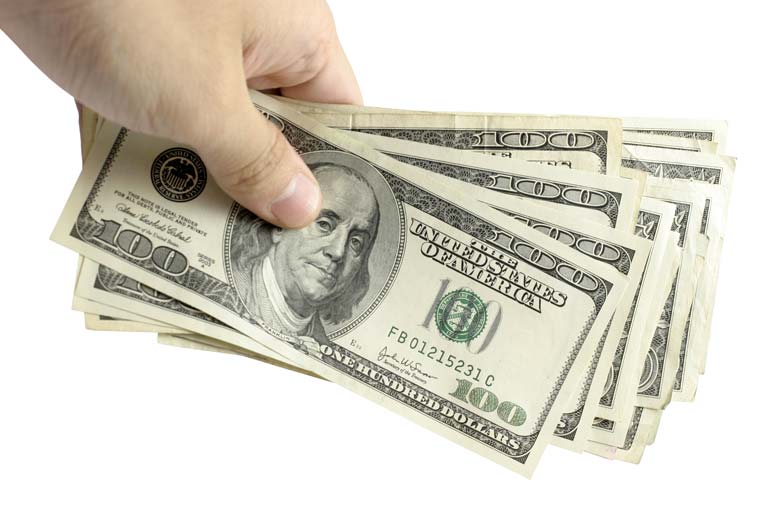
Investors seeking out growth stocks often discard dividends as unimportant, but they really shouldn't. After all, there's no greater sign of a company's health than the regular, consistent payment of dividends. When the board of directors approves the payment of the quarterly dividend, it sends the unmistakable message that more cash is expected down the road.
Thus, a focus on dividends can help you improve the quality of your growth portfolio.
"We consider a reliable and growing dividend to be a major sign of a company's health," says
Today, we will look at seven solid dividend-paying growth stocks. It's not unusual for growth stocks to return 20% or more per year when they're on a good run, so the dividends paid will be a small part of the total return. It's exceptionally rare for a true growth stock to sport a high dividend yield.
Still, it's nice getting paid something in cold, hard cash. If anything, the dividend allows you to realize a small portion of your gains along the way without having to sell your shares.
Microsoft
Market value: $861.8 billion
Dividend yield: 1.7%
Microsoft (MSFT, $105.91) is one of the biggest turnaround stories of the past decade. Even five years ago, it would have been a tough sell to call Microsoft a "growth stock." Its primary profit drivers were its Windows operating system and Microsoft Office - two franchises that have been around for decades.
But under the leadership of CEO
Over the past four years, MSFT has rocketed 150% higher whereas its dividend payment has only jumped by about 65%. In turn, Microsoft's dividend yield has really come down in recent years and currently stands at about 1.7%.
Still, that's more than most short-term bank CDs pay, and you're getting that cash from a growth play. Microsoft is by no stretch of the imagination cheap at current prices, but you're getting a piece of one of the truly great tech stocks of our time.
Apple
Market value: $1.1 trillion
Dividend yield: 1.4%
Given the very different directions the companies have gone over the decades, it's almost hard to believe that Microsoft and
But while the two former rivals have gone separate ways, both are growth stocks with promising histories of raising their dividends.
Starbucks
Market value: $74.0 billion
Dividend yield: 2.6%
While ubiquitous coffee chain
It sometimes seems like there is quite literally a
Few investors buy SBUX primarily for its dividend. They buy the stock for its explosive growth and for the power of its brand, which isn't far behind the
Yet
At some point,
Home Depot
Market value: $220.3 billion
Dividend yield: 2.2%
Not too many retailers can be said to be "Amazon-proof." E-commerce is disrupting virtually the entire retail sector.
But one notable exception is home-improvement specialist Home Depot (HD, $189.74). When you need tools for a project, you need them now. You generally don't have time to wait for delivery. Secondly, the nature of the merchandise makes seeing it up close and personal all the more important. Most of us aren't professional contractors, and we don't necessarily know what we need for a project until we get into the hardware store and really start digging in.
This also is an industry where a knowledgeable salesman is critically important, and that's not something you can reliably get online.
Home Depot grew its revenues by 8.4% and its profits by a whopping 31.2% in its most recent report. Meanwhile, the company pays a 2%-plus dividend and has added to that payout every year since 2009.
Lowe's
Market value: $85.3 billion
Dividend yield: 1.8%
Home Depot owns a spot among good dividend-paying growth stocks. Rival
An interesting byproduct of the 2008 meltdown in the housing market is that new-home construction was massively cut back for years. That wasn't a problem in the years immediately following the meltdown, as we had a glut of foreclosed homes to work through. But years later, that inventory has long since dried up, and we now have a new-home shortage, which is leading to increased demand for existing older homes, many of which need a little work.
This is fantastic news for home improvement retailers, and
At current prices,
SEE ALSO: 5 Blue-Chip "Marijuana Stocks"
TJX Companies
Market value: $67.8 billion
Dividend yield: 1.5%
With the economy booming, it might be somewhat surprising to see a chain of discount stores that sell off-market inventory performing so well. This might normally be considered a counter-cyclical business that does better when the shekels are tight.
Yet
Amazon.com may very well be killing traditional retail. But it's important to remember that
At current prices, TJX yields 1.5%. That's not high by most definitions. But it is worth noting that the company has raised its payout every year for 22 years and counting.
Oneok
Market value: $26.6 billion
Dividend yield: 5.1%
You don't often see oil and gas companies listed among growth stocks. The gritty world of energy usually gets relegated to lists of value stocks.
Well, pipeline operator Oneok (OKE, $65.22) is a clear exception here. Revenues were up about 9% last quarter, but earnings were up a whopping 292%.
Given how volatile earnings can be in this sector, we can take that growth figure with a healthy grain of salt. But in an industry known for its risk-taking "cowboy capitalists," Oneok has been a model of responsible growth. The company is aggressively building out pipeline and other infrastructure in America's most productive onshore fields, yet it's not being reckless like some of its peers were in the run-up to the 2015 energy rout. Its debt levels are low at just 3.6 times EBITDA. As a point of reference, rival
OKE yields an attractive 4.8% at current prices, making it one of the highest-yielding growth stocks you're ever going to find.
Charles Lewis Sizemore, CFA, is a Contributing Writer for Kiplinger.


 Contact The Editor
Contact The Editor
 Articles By This Author
Articles By This Author